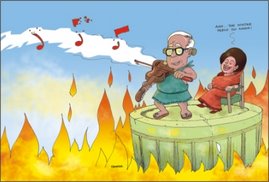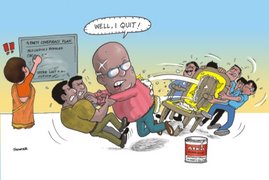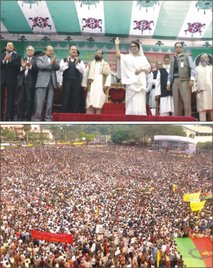Bangladesh is a parliamentary democracy, since Independence. Bangladesh started its journey with the Parliamentary System of Government, then switched over to the Presidential System and in 1991 reverted to the Parliamentary system. Its 1972 constitution has been amended several times. The president is chief of state and the prime minister heads the government.
The ruling government took power on Oct 2001 and the term ended on Oct 2006 . According to the current poll schedule, Bangladesh 2007 National Assembly Election will be held on January 22. The last date for filing nomination papers for the ninth parliamentary election will be December 21.
Bangladesh's political scene has been tumultuous since independence. Periods of democratic rule have been interrupted by coups, martial law, and states of emergency. In the midst of this confusing scene, there are 5 major political forces in the country. The Bangladesh Nationalist Party (BNP) and its allies forming the right-of-center to conservative grouping in Bangladesh and is currently in power in Bangladesh. The current opposition is led by the Awami League (AL), which initially saw its birth as a socialistic organization but has now transformed into a center/center-left political stream. To the left are the pro-Soviet Bangladesh Communist Party, factions of the Jatiyo Samajtantrik Dal, and other socialist groups advocating revolutionary change. To the right is a group of parties, including Jamaat e Islami and Islami Oikyo Jote, who calls for an increased role for Islam in public life. The fifth major pary is the party founded by ex-military ruler General Ershad, the Jatiyo Party (JP) is ideologically not too different from the AL or the BNP but operates independently.
Election -2007
The ninth parliamentary elections are scheduled for January 2007, with political alliances led by the Bangladesh Nationalist Party (BNP) and Awami League (AL) in the fray. The main issues include poor performance and mal-governance, rise of extremism and, most importantly, holding free and fair elections despite a deteriorating law and order situation in the country.
The last five years rule was plagued with disapproval by the liberals and moderates. Despite this, the ruling alliance sought to strengthen itself and widen its electoral reach. The BNP and its two allies, Jamaat-e-Islami and Islami Oikya Jote, are likely to be joined by an entrenched political force, the Jatiya Party (JP) led by H.M. Ershad. This political alliance between ultra-rightists (Islamic Parties) and the BNP is of concern, as their political platform is anchored in an undemocratic military ethos, strong enough to defeat the liberal democratic forces. On the other side, BNP dissidents like AKM Badrudozza Chowdhary (Bikalpa Parisad) and Deputy Speaker of Jatiya Sansad, along with some MPs of the newly formed Liberal Democratic Party have joined the 14 parties opposition led by the Awami League, which has enthused this new alliance of liberal democratic forces.
The ruling government took power on Oct 2001 and the term ended on Oct 2006 . According to the current poll schedule, Bangladesh 2007 National Assembly Election will be held on January 22. The last date for filing nomination papers for the ninth parliamentary election will be December 21.
Bangladesh's political scene has been tumultuous since independence. Periods of democratic rule have been interrupted by coups, martial law, and states of emergency. In the midst of this confusing scene, there are 5 major political forces in the country. The Bangladesh Nationalist Party (BNP) and its allies forming the right-of-center to conservative grouping in Bangladesh and is currently in power in Bangladesh. The current opposition is led by the Awami League (AL), which initially saw its birth as a socialistic organization but has now transformed into a center/center-left political stream. To the left are the pro-Soviet Bangladesh Communist Party, factions of the Jatiyo Samajtantrik Dal, and other socialist groups advocating revolutionary change. To the right is a group of parties, including Jamaat e Islami and Islami Oikyo Jote, who calls for an increased role for Islam in public life. The fifth major pary is the party founded by ex-military ruler General Ershad, the Jatiyo Party (JP) is ideologically not too different from the AL or the BNP but operates independently.
Election -2007
The ninth parliamentary elections are scheduled for January 2007, with political alliances led by the Bangladesh Nationalist Party (BNP) and Awami League (AL) in the fray. The main issues include poor performance and mal-governance, rise of extremism and, most importantly, holding free and fair elections despite a deteriorating law and order situation in the country.
The last five years rule was plagued with disapproval by the liberals and moderates. Despite this, the ruling alliance sought to strengthen itself and widen its electoral reach. The BNP and its two allies, Jamaat-e-Islami and Islami Oikya Jote, are likely to be joined by an entrenched political force, the Jatiya Party (JP) led by H.M. Ershad. This political alliance between ultra-rightists (Islamic Parties) and the BNP is of concern, as their political platform is anchored in an undemocratic military ethos, strong enough to defeat the liberal democratic forces. On the other side, BNP dissidents like AKM Badrudozza Chowdhary (Bikalpa Parisad) and Deputy Speaker of Jatiya Sansad, along with some MPs of the newly formed Liberal Democratic Party have joined the 14 parties opposition led by the Awami League, which has enthused this new alliance of liberal democratic forces.






No comments:
Post a Comment